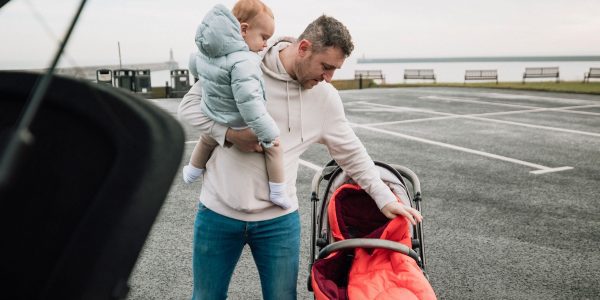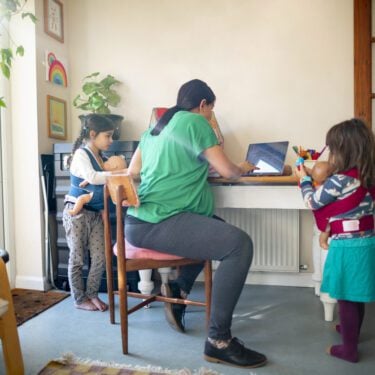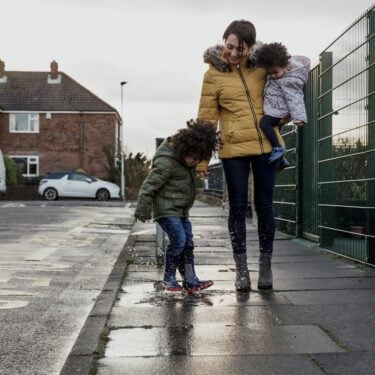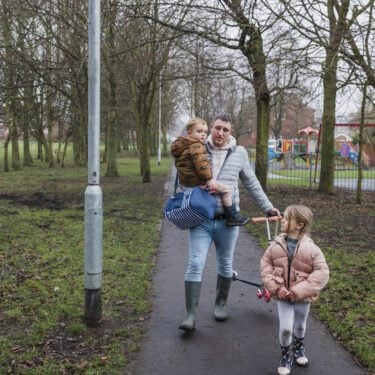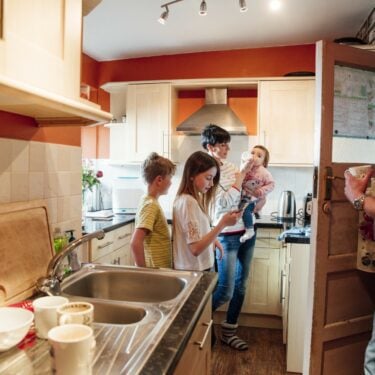The Government should review data collection on families by all publicly-funded bodies, which currently risk failing millions of children because they typically gather such weak information about fathers.
That’s the recommendation of a three-year study into how information on fathers and father-figures is recorded in Britain’s ‘blue chip’ research and statistical datasets that shape research and government policy. The data on fathers who do not live full-time with their children is especially likely to be meagre or non-existent.
‘Non-resident’ fails to capture father’s involvement
“Where’s the Daddy?”,funded by the Nuffield Foundation, recommends that today’s diversity of fathering should be captured. First, fathers, such as birth, adoptive or ‘step’, should be differentiated: often these are lumped together. Second, it recommends that separated fathers should be reclassified in terms of whether – and how much of the time – they live with their children: full-time co-resident, part-time co-resident or non-resident. Currently, these fathers are typically classed as ‘non-resident’ or even as childless. In fact, they often spend a great deal of time (even as much as the mother) with their children and are very important to them and to their long-term outcomes.
The study investigated how sixteen large-scale repeated cross-sectional and longitudinal datasets identify, differentiate and collect data about British fathers. It was carried out by the Fatherhood Institute, the UK’s largest trainer of healthcare, early years, education and social work practitioners in how to harness fathers’ enormous impact on children’s lives. The Institute has also found ‘dad data’ gaps in these services: sometimes there is only space in the records-system to enter one parent’s contact details when children are registered in nurseries, schools, hospitals or child protection services.
Tracey Budd, Programme Head at the Nuffield Foundation said: “Families are of pivotal importance in our society and central to social policy, but research and policy has not kept up with the pace at which family structures have become increasingly diverse. In practice, this means that non-resident parents – often but not always fathers – are at particular risk of being excluded from the data sources used to inform decisions that affect families across the country. We have funded this research as part of our work to ensure that survey and administrative data reflects the reality of contemporary family life, and we will continue to work with the Fatherhood Institute and others to help facilitate the enhancement of data collection to better represent fathers.”
Rebecca Goldman, lead author of the datasets review, said: “We must put dads into the data. The large research datasets that we studied are drawn upon by hundreds of researchers and policy makers every year, to understand and shape social practices. Yet the insights most of the datasets afford into father-child relationships and patterns of care are often inadequate.”
Adrienne Burgess, Joint CEO of the Fatherhood Institute said: “Britain has sophisticated data collection systems for recording children’s health, educational progress and ethnic and other diversities. It is unacceptable that these systems fail to record the role that millions of fathers and father-figures play in their lives.”
“The Government should urgently review and update data-gathering methodologies in research, statistical and administrative datasets. It should also examine practices in surgeries, hospitals, schools and social services that provide support to children and families. Fathers play a vital role in the day-to-day care of children. Today, four million children do not live full-time with both their birth parents. Public services should not be ignoring their dads.”
The report’s recommendations
Adequate parenthood questions for both men and women should be viewed as a priority in data collection for research and administrative datasets, alongside other core variables such as “sex”/gender, socioeconomic group and economic activity. The authors of the report recommend the following:
1. Parent focus: In addition to ‘household grid’ questions that identify parents whose children live wholly or primarily in their household, datasets should routinely ask questions to identify fathers and mothers with dependent and/ or adult children living wholly or primarily elsewhere. The questions asked should also establish patterns of part-time residence/ overnight care.
2. Child focus: Similarly, datasets should routinely ask questions to identify dependent children with a living birth (or adoptive) father or mother living wholly or primarily elsewhere (such parents are much more likely to be fathers). The questions asked should also establish patterns of part-time residence/ overnight care.
3. Differentiating dads: Organisations funding and directing studies that are cross-sectional (administered at one point in time) or that follow children or parents over time (longitudinal) should comprehensively differentiate relationship categories (birth parent, adoptive parent, ‘step’ etc.) by adding to and amending questionnaires.
4. In-depth understanding: Funding should be allocated to enable longer interviews with, and observational data for, full-time co-resident fathers and father-figures, in order to establish a more comprehensive picture of how these men affect children’s childhoods and lives into adulthood.
5. Fathers who live separately from their child’s mother: Fathers or mothers (including father- or mother- figures) who leave the child’s original household during the course of a longitudinal study should be followed into new households and interviewed directly. In particular, data collection directly from those who maintain the highest levels of involvement, could be trialled. Fathers with a substantial pattern of overnight care could be defined as a second household for data collection, including interviews with any cohabiting partner (step-parent).
6. Next steps in data collection: Relevant individuals and bodies (including, for example, the National Statistics Harmonisation Group, the CLOSER harmonisation stream, the UK Data Archive and the Royal Statistical Society) should collaborate to consider this study’s findings and re-evaluate how the design of data collections can take account of the much greater diversity of families in recent decades. The ESRC review of longitudinal studies and preparations for the 2021 Census make it a particularly opportune time for this to happen.
7. Service provision: Adequate parenthood questions relating to both fathers and mothers should be included as a priority when children and adults are registered in health, education and family services (including maternity services, hospitals and with GPs, in nurseries and schools, in adult and child mental health services, in social work and social care) alongside other core variables such as “sex”/gender, ethnicity, education and socio-economic factors.
Related
-
Full report: Where’s the daddy? Fathers and father-figures in UK datasets3MB | pdf | 01 January 18
-
Condensed report: Where’s the daddy? Fathers and father-figures in UK datasets2MB | pdf | 01 January 18
-
Executive summary: Where’s the daddy? Fathers and father-figures in UK datasets2MB | pdf | 01 January 18

